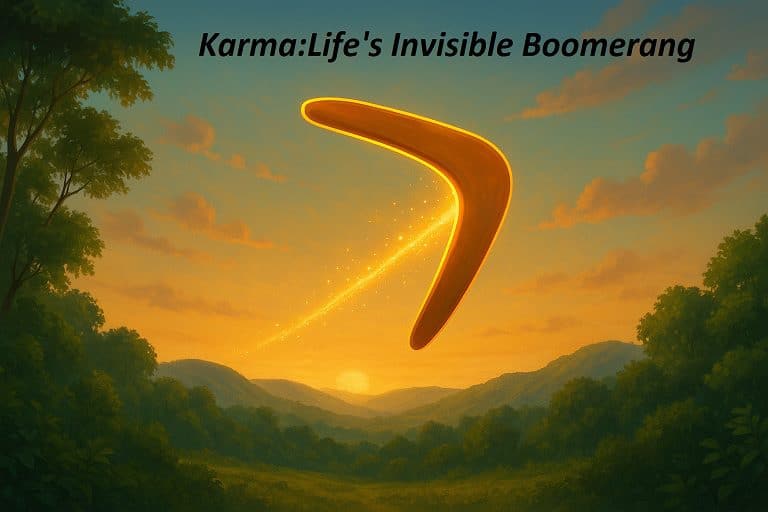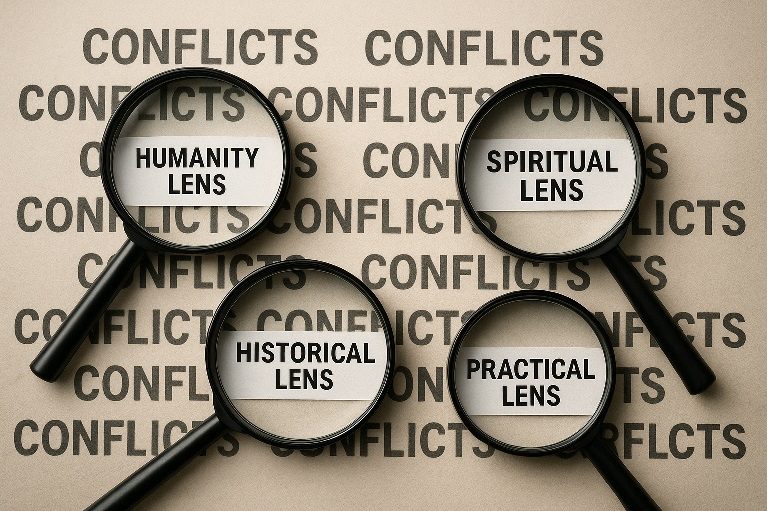What Is Karma And How It Works As Life’s Invisible Boomerang
Sir Isaac Newton probably never imagined that his Third Law of Motion — “For every action, there is an equal and opposite reaction” — would end up being quoted by monks, philosophers, and TikTok spiritual coaches. He dropped an apple, discovered gravity, and in a way, stumbled into the moral physics of the universe. Every action we send out eventually finds its way back — sometimes gently, sometimes like a slap from the divine.
That, in essence, is karma — life’s invisible boomerang.
What Karma Really Is

Long before Newton’s apple dropped and startled him, Hinduism, Buddhism, and Jainism were already teaching karma as a spiritual law of cause and effect. Simply put, every action — physical, emotional, or mental — plants a seed. That seed doesn’t care about your religion, race, or follower count. It just waits patiently, growing until the day it bears fruit — sweet or bitter.
In Hindu belief, karma can follow you beyond this lifetime. In Buddhism, it’s the moral engine that powers rebirth. In Jainism, karma is almost like a fine dust that sticks to your soul — the cleaner your actions, the lighter your being.
Karma in Modern Language
Interestingly, this principle isn’t just ancient wisdom — it pops up in modern teachings too. The Secret, for example, calls it the Law of Attraction: the energy you put out into the world — through thoughts, words, and actions — comes back to you. Just like karma, it works whether you believe in it or not. Positive energy brings blessings; negative energy eventually returns in kind. In a way, Newton, the sages, and The Secret are all telling the same story: life keeps score, and the universe never forgets.
Modern Karma on Display
You don’t need to meditate on a mountain to see karma. Just open the news.
Remember R. Kelly? For years, he sang about being the world’s greatest while doing ‘stuff’, until the universe decided it had heard enough. Or Puff Daddy — a man who thought money and fame could buy loyalty and nearly any self-pleasing acts. Suddenly, years later, every skeleton in the studio closet began doing interviews.
Even in politics, we see karma on tour — dictators who once ruled with an iron fist suddenly needing permission to leave their hospital beds. Life has a strange way of balancing its own books. The point isn’t to gloat. It’s to recognize that karma doesn’t rush. It’s never late, never early. It arrives exactly when the soul is ready to face itself.
Ancient Echoes of Karma
History is full of poetic paybacks. Take Nero, the Roman emperor who burned his own city and blamed Christians for it. Eventually, he died by his own hand, abandoned and despised — the ultimate unsubscribe from history’s mailing list.
Even in African folklore, there’s wisdom in disguise. One story tells of the greedy hyena that tried to follow two meat-smelling paths at once — and ended up splitting itself in two. Moral: greed, deceit, or cruelty — they all circle back with receipts.
All Religions, One Principle
Here’s where it gets beautiful — karma is not just an Eastern thing. Every major faith has a version of it:
- Christianity: “Do unto others as you would have them do unto you.”
- Islam: “Whoever does an atom’s weight of good shall see it, and whoever does an atom’s weight of evil shall see it.” (Quran 99:7-8)
- Judaism: “The measure you give will be the measure you get.”
- African traditional belief: “The footsteps of the wicked never reach the end of the road.”
Different languages, same truth: life mirrors your energy. What you throw out, you meet again — sometimes disguised as coincidence.
Jesus and the Kingdom Life
Even Jesus, in His Kingdom teachings, echoed this universal principle — though He gave it a deeper twist. Instead of merely avoiding bad karma, He called people to transcend it through love, forgiveness, and mercy.
When He said, “Bless those who curse you” or “Turn the other cheek,” He wasn’t promoting weakness. He was showing a higher law — that love interrupts the karmic cycle. By responding to hate with grace, you break the chain of reaction and plant new seeds of peace.
The “Kingdom life” Jesus spoke about is, in a sense, divine karma — not driven by revenge, but by restoration. It’s about aligning yourself with a universal rhythm where your heart, words, and actions move in harmony with goodness itself.
Final Thought: The Universe Never Forgets
Karma doesn’t have an expiry date. It’s not revenge — it’s reality balancing itself. You can’t bribe it, fake it, or edit it out of your Instagram story. Whether you’re a king, a preacher, a mechanic, or a billionaire — life eventually sends you the energy you sent out.
So maybe the safest investment isn’t crypto or gold — it’s kindness. Because while money loses value, good energy compounds forever. Karma is God’s invisible boomerang. Throw it with love, and it comes back carrying blessings. Throw it with hate, and you’ll be ducking for the rest of your life.
Since the universe is always listening, always recording, always sending back what you give. So start planting seeds you actually want to harvest. Smile at strangers, help a friend, speak truth even when it’s awkward, forgive that person who keeps testing your patience. Treat your words, thoughts, and actions like investments — because they are. Karma isn’t just waiting to punish you; it’s also waiting to reward you. Throw kindness, integrity, and generosity into the world, and watch your invisible boomerang return with blessings you didn’t even imagine.







